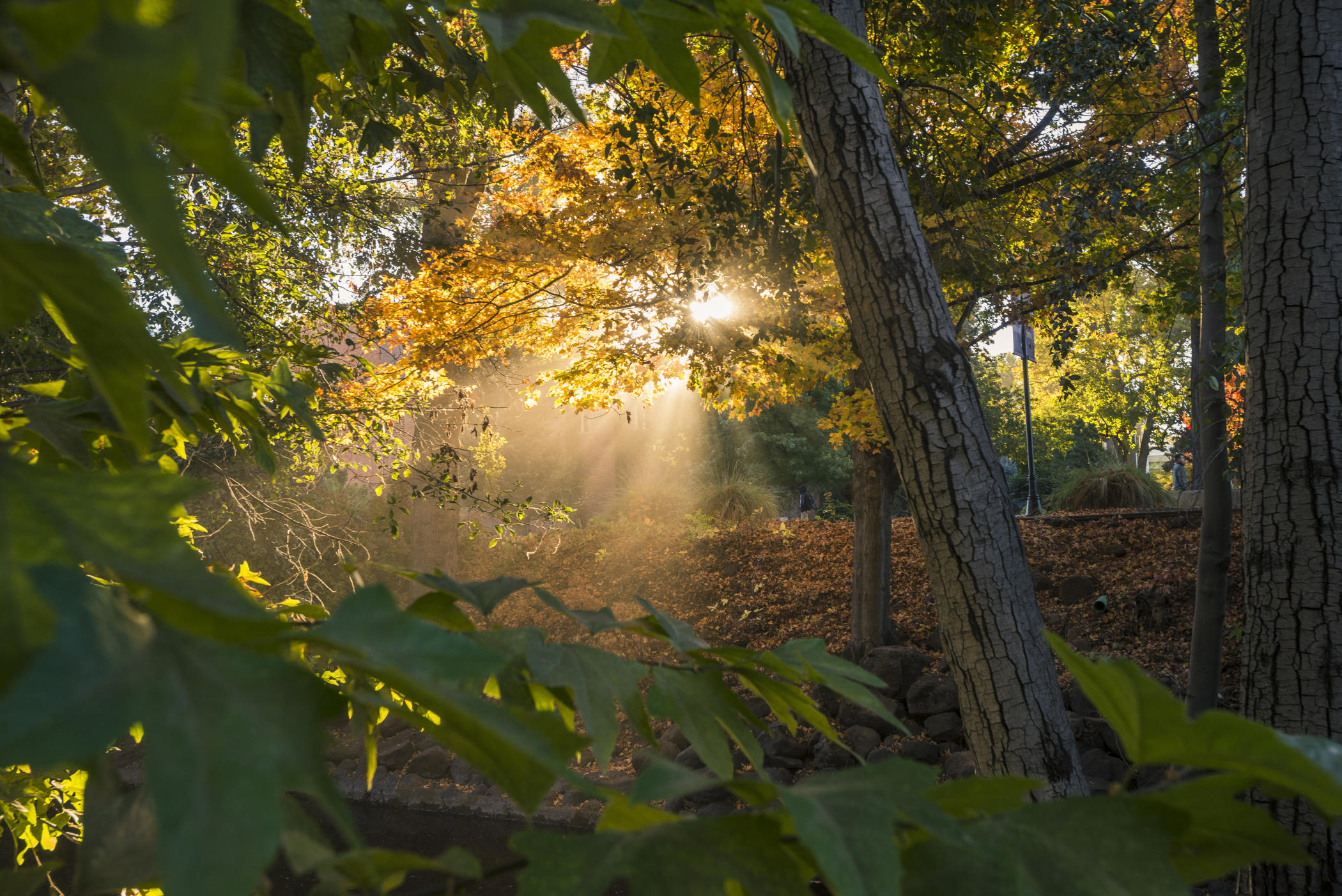The Long Process of Healing and Recovery

A beautiful crisp fall morning on Wednesday, November 7, 2018 in Chico, Calif. (Ryan McCasland/Student Photographer/CSU Chico)
Editor’s Note: As we mark the one-year anniversary of the Camp Fire, we are honoring its impact on our community with a series of stories embracing the themes of remembrance, recovery, and resurgence.
As I stood outside my office at noon on November 8, it was as dark as midnight. All the outside night lighting was on, and a dark, eerie heaviness hung in the air. Something deep in my heart told me I needed to open my counseling center to other professionals to help treat the trauma people were experiencing in the Camp Fire. This was too big for us to handle alone.
In the days and months that followed, we did just that.
From the very first morning of this horrific fire, the staff at The Growing Place Counseling Center set our hearts to do all we could to help the people of Paradise and the surrounding communities so they could recover emotional stability after experiencing such horrendous trauma.
In the last 11 months, we have given hundreds of hours of individual and group therapy at no cost to the survivors. As professional therapists, we know that early intervention reduces the occurrence of PTSD. With the need so great, we opened our offices to other trained trauma therapists from across the North State to help us, and they came! The last professional therapist from outside our area finished her final trauma group here in August—eight months from the start date in January 2019.
What I saw, in the early days and months after the fire, was most people were experiencing foggy thinking or numbness, lack of focus, disorganization, fatigue, confusion, and heightened sensitivity and startle responses. They were what we referred to as “frozen” and not fully functioning.
Now, at the first anniversary of the fire, they are still hurting deeply. They may have bought a home or a fifth wheeler or secured some shelter and safety, yet they are not OK. Families are struggling. Marriages are challenged, and the children are moody or angry and they wonder why. They report depression, increased anxiety, and feelings of hopelessness. They say, “Why do I feel like this? I am safe. I should be normal, but I am not OK.”
What they are experiencing is the grief and loss that comes when the full extent of what they have experienced is more real—and it hurts. People have not only lost homes and possessions, but they have lost neighbors, friends, playmates, and businesses they frequented. Every area of their life has changed. They want to go home to what was safe and familiar, and they can’t.
What I find is that many, many people don’t understand that what they are experiencing now is part of recovery. It is in our human nature to want it to just go away or to just get over it, but there is no magic like a “Get Out of Jail Free” card in Monopoly.
Healing and recovery are processes that take time, but not time alone—it also takes work. Facing the future, even when the emotional pain still comes and goes in waves, takes courage and resilience.
Finding any little thing that is good or positive in every day is hard at first, but it helps us to get through the tough times. Emotional healing may take a year or two or three, but in those healing times we grow, live, and love, and that’s what life is all about.
What I believe is essential in getting to the other side of trauma and grief is in making meaning of what one has experienced. This happens by finding some value or purpose and the ability to be grateful in even the smallest thing. Any kind word or deed makes life better. Sharing life, person to person, creates community.
And in that, we are all in this recovery process together. Each small step forward is a gain—not just a gain for one, but a gain for everyone.
Judith L. Thompson (Psychology, ’96; MA, Psychology, ’99) is a licensed marriage and family therapist, as well as the executive director and founder of The Growing Place Counseling Center in Chico. Her journey to become a therapist started in 1988, when her 17-year-old son was killed in an accident. In searching for ways to heal, she realized she had an unfulfilled dream: to go to college. After earning her bachelor’s and master’s from Chico State, she opened The Growing Place in 2011 with the belief that in spite of trauma, grief, and loss, we can heal and become more than we were before.


